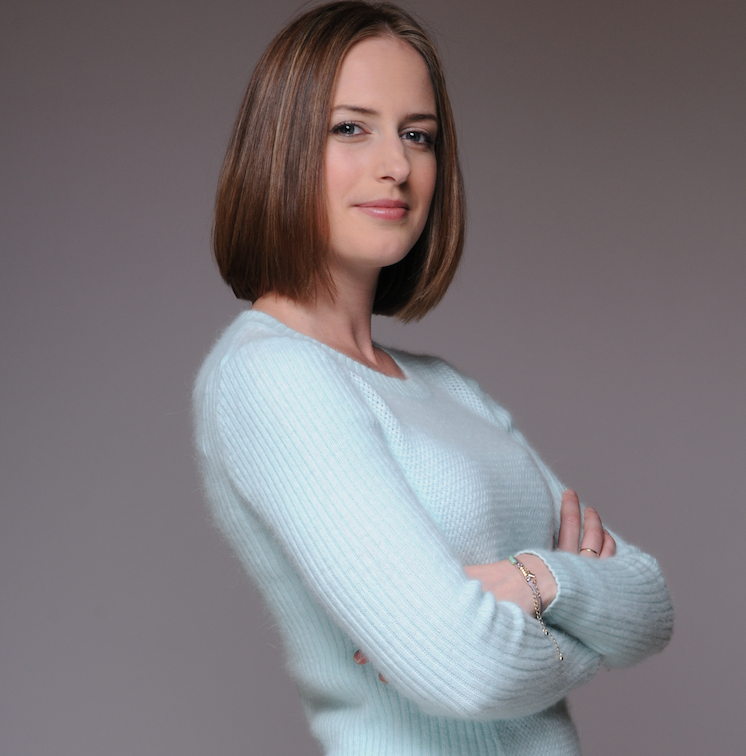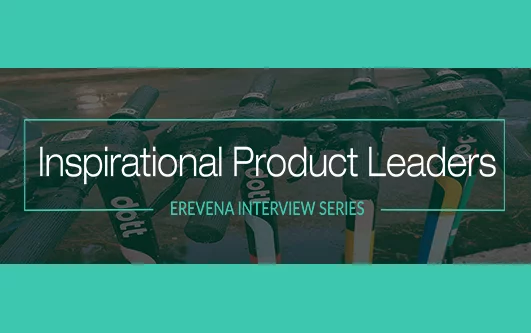Vivienne Sung recently moved from Facebook to take on a new role as VP Product at Bumble. Epitomising the varied and exciting career paths taken by many product leaders, she talks to Erevena’s Jonathan Bryant about her journey through start-ups and big corporates and the lessons learnt about what makes a great product leader.
How did you get into product management?
Like so many product leaders, I didn’t set out on this path directly. I was an Oxford graduate in psychology and philosophy and joined a strategic consulting firm. I thought it was a good generic career choice that could take me anywhere, but soon found I wasn’t cut out for the hierarchical nature of consulting. I was too outspoken and simply wanted to talk about the big strategic picture from day one, rather than being just a piece in the puzzle. So, despite having a partner mentor who appreciated my outspokenness, I don’t think I would have been able to progress as quickly as some others in that industry. Then a life-changing moment saw my career taking an entirely new direction with a move into product management.
Tell us more about this move into product management
I’d had an operation and ended up with an infection that left me in intensive care with pneumonia and a collapsed lung. At a really low ebb, I realised I didn’t want to continue doing what I’d done for the past three years. The industry had been hit by the recession and I’d seen so many people being made redundant. I needed to change direction. When I came out of hospital, I started studying organic chemistry, thinking it might lead to something more meaningful for me, such as the medical profession. But just as this seemed to be my next step, a former colleague who’d joined a venture capital company encouraged me in a different direction. He told me about a start-up in their portfolio looking for a product manager — only no one seemed to know what the role entailed. He explained that these were the people who found the big problems and fixed them, which sounded like the sort of thing I was looking for.
How did the transition to that first product manager role go?
I had a couple of interviews with the VP Product, John Earner at Playfish, a UK-based gaming company just starting to go into the US. Like me, he was a former strategy consultant and we got on well. He was willing to take a punt on me even though I didn’t know what it was really all about. At the time, the company’s product was one of the first social gaming apps on Facebook conquering the freemium model. When I turned up there wasn’t a clear job definition and I was joining a team that hadn’t worked with a product manager before.
These were artists and game designers, rather than commercial thinkers and I had to inject a little bit of commerciality into their thinking. Like all product managers, I quickly discovered I had to learn to deal with the different working styles, sensitivities and passions within a cross-functional team. And I loved it. It was all about relationships and coaching people on how to be a little bit more structured, while not losing the essence of what they were delivering in terms of the fun of the game and why people played it.
Did your experience as a strategy consultant help?
Yes, being able to break down problems into the component pieces and lay out information clearly in order to influence people are part and parcel of strategy consulting, so it was a good grounding for product management. It gave a level of maturity from being in boardrooms, hearing those strategic conversations and learning about how leadership thinks.
How do we encourage more people to consider product management as a career?
I think it’s fair to say that most smaller firms won’t be looking to hire a new graduate into product management. Typically, it’s something that’s a conscious sideways career step after gaining experience in other roles. So, we need to put more effort into educating graduates about picking the right thing to do beforehand that will enable this sideways step. It could be any number of things, including strategy consulting, software engineering, data science, or something entrepreneurial — I’m always happy to recruit a former entrepreneur as they’ve got the experience that can be turned into amazing product managers. Ultimately product managers need the maturity to influence the most senior people and to defend their opinions.
How do we make it easier for people to get into product management?
I think it’s probably become a lot harder to get someone to simply take a punt on you as happened to me at the start of my career. Everyone talks about the challenge of breaking into product management and how much of a hurdle it is. But, as the industry matures, we’re going to see more and more companies building Asoociate or Rotational Product Management (APM or RPM) programmes to try and help people make those transitions. RPM programmes, for example, are being used by the big tech companies to let people transition into product management via a sort of apprenticeship model.
Of course, this requires a degree of organizational maturity because coaching someone through the very beginning of their PM career is incredibly labour intensive, and that’s why we aren’t seeing these programmes in smaller companies much. I’d also advise caution when picking your programme – they will not all be alike in their level of support and credibility.
Why do women make such great product leaders?
The same things that make anyone a great product leader: strategic thinking, strong influence skills, ability to deliover results by working through others, grit and resilience, empathy. I think in that last part that a woman has some specific advantage – we come pre-wired with a strong empathy muscle.
You started and sold your own business in record time — can you expand on this?
After I left Playfish I did a bit of consultancy for a while, during which time I built my own business in partnership with a friend from Oxford University. It was an e-commerce start-up that we took from development to launch in only three months, followed by a buy-out just 12 weeks later when we sold to a company called fab.com. They were one of the boom-and-bust stories of tech after raising hundreds of millions of dollars then going to nothing about two years after they acquired us.
It was a wild six months and I needed all the resilience I could muster at the time. We had built a company that we deeply cared about with many decisions based on what would be right for our team. Then suddenly, it was out of our hands and we couldn’t protect the people who’d helped us grow the business which was really hard for us. While I didn’t learn a great deal about product management during that time, I certainly learned a lot about how I would want to run a company and the kind of company I wanted to be part of.
You then moved into the world of big corporates — what prompted this?
Joining Marks and Spencer was almost a retreat to safety after such an emotional rollercoaster. I needed to go and recharge. I was contacted by Kyle McGinn at M&S who has been a huge mentor to me during my career. He was starting a digital lab and wanted a talented product manager to take the leadership role in it and really convince M&S of the value of technology. In a sense it was like a classic innovation lab and, at that time, it was fun prototyping solutions and working across the business to explain the value of technology. But I wasn’t there that long because I felt I couldn’t make a big enough impact on the organisation or change the business trajectory — not then, at least! I was back there less than two years later.
You went from a digitally transforming company to a digital one — how was that?
I had an opportunity to join Houzz, a company I’d idolised as an entreprenuerI went in as GM for the UK, but it was more of a sales and operations role because the tech team was based over in America. I did manage to get in some product work when I volunteered to product manage the internationalization across all the countries they were launching in, but it was just a side project. Nonetheless the role was helpful in teaching me more about running a sales organisation and, crucially, it reinforced my belief that I am a product leader, not a sales leader.
Coaching is something you feel strong about — why is that?
Yes, both mentoring and coaching are important. I don’t think you need the same mentor throughout your career, so long as you have someone who you can talk to about your decisions at different stages of your working life — someone who has created similar results in similar environments. It doesn’t even have to be a mentor specifically, but someone you can have a dialogue with so that you don’t feel completely alone.
A coach is different. I believe everyone can benefit from having a coach. It’s a paid relationship, so the dynamics are a little different, but it is probably the best money you’ll ever spend on yourself. You may be able to get your company to pay for your coaching but, if not, I still advise everyone to think about funding it themselves even if it’s just for a short period, say six months or so.
You met your coach at Pollen — how did that come about?
It was at Pollen that a coach (Ali Levin) changed my entire perspective on how to run a product team. The company was a start-up (then known as StreetTeam) and I joined with the mindset that my job as a product leader was to be the smartest, the best, the person with the vision who just knew what to do. I held everyone to my own incredibly high standards. Then a 360° peer review showed that although I was getting results, I was leaving a trail of scorched earth in my wake. I was really lucky that the CEO, Callum Negus-Fancey, put his faith in me and said he knew I could change, he hired me a coach to help adapt my leadership style.
She was a phenomenal individual who made me see that my visionary and pace-setting leadership style where I expected everyone to keep up with me could be softened. She helped me understand that I had a strong affiliative leadership style naturally and that if I could balance the pace-setting and vision with more affiliative and coaching styles I would be overall a much better leader.
When the next 360° peer review came round, she was there for moral support if things went badly. But it was a total turn around. In fact, it felt like the feedback was about a different person. I began to hear from lots of junior women who said I was an inspiration to them and was able to mentor them through hard problems. It was my coach who helped me figure out that it was OK to get people to do more of what they’re good at, to try and multiply them, rather than dwelling on areas where they didn’t meet my high expectations. It was a transformational moment in my thinking about leading people. Before then I felt the company’s success was all on me but I’m much happier knowing that product leadership is actually about creating an environment where your team can grow and succeed and that everyone has a role to play in our success.
Tell us about more about your time at Pollen
I loved the founders, Callum and Liam, but most of all, I loved how they were thinking about building a company. I joined as Chief Product Officer but was essentially their first product manager. They’d been built by sales guys, and I quickly recognised they needed to build a product organisation. I saw it like a digital transformation even though they were a digital start-up and over three years went from being the only product person to having a sizable product team — and building teams for design, user research, customer experience, etc. We went through a couple of rounds of investment before I left just two days after the Series C round feeling I’d taken the company on a journey from where it could continue to succeed.
Facebook was a big move — how did that come about?
Kyle McGinn had joined Facebook as director of product from M&S and got in touch. He said that they were beginning to get the roles at the right level of seniority for me in London, so I went for an interview and got an offer to join as a PM Lead. I spent a year working on Workplace, and then moved and spent my second year leading a team on Shops. The ease of internal mobility is definitely one of the best things about growing a career at Facebook.
Is there a right way and a wrong way in product management?
In the end, good product management is about getting the best outcomes with whatever resources and ways of working are possible in the company you’re working for at the time. So, no there is no right or wrong way, although there are some core concepts of a good product organization. The most important thing is that product managers need to be empowered to do the right thing, and to really consider their customers, in balance with the business needs. I believe a product leader should be flexible in the mechanics of how their teams get the outcomes they’re looking for… no one really does it exactly like the books and you can waste a lot of energy obsessing over the how. Transformations take time and in the interim you can’t afford not to deliver results for your customers.
What do you enjoy most about being a product leader?
I love working with founders to really dig deep into their long-term vision and them help them to craft the strategy that will get them there. I want to understand the fundamental human drives, the behaviours, the problems that they are really hooking their ideas on to so that, as a product leader, I can figure out how to make the magic they have in their heads real. I thrive on plotting a path from where they are now to where they want to be.
I also enjoy actively coaching product managers, helping them to reframe problems and unstick where they’ve got stuck. So much of product management is psychology and I just love those problems that I can help people address by getting them to think differently about them. I’m back to the importance of coaching again and, in this case, it’s about me using my leadership skills to coach others to do things better.
Finally, what next for you?
Having completed our IPO at the start of 2021, it’s an incredibly exciting time to be at Bumble. There’s so much opportunity for me as a product leader to support the company’s transition from a hyper-growth start-up to a scaled organization with a new level of maturity. I’m looking forward to continuing this growth journey and working with Bumble’s Founder and CEO, Whitney Wolfe Herd, to help people make healthier and more equitable connections in all areas of life. I’m currently building out the team and I will be hiring a lot of PMs in the next six months so if you are an experienced product manager that is passionate about human connection and want to be a part of building kinder, safer internet then please do get in touch with me on LinkedIn.
Share this article:













